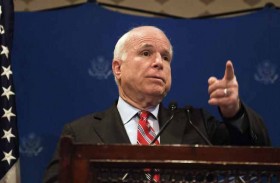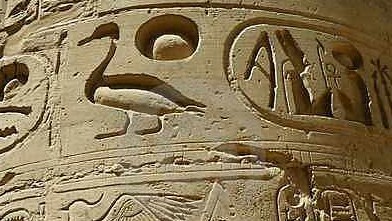 A 32-minute press conference can go a long way toward making an already unpopular message more problematic especially if you’re a U.S. politician in a country like Egypt. That was in short the outcome of Senators John McCain and Lindsey Graham well-intended visit to Cairo this week, which ended up deepening the rift between Egypt’s opposing political factions, and creating more suspicion about U.S. policy goals and alleged plans for the country. McCain and Graham went to Cairo to “reinforce in a bipartisan fashion the message that we have to move to civilian control” toward an “inclusive, democratic approach.” And that all sounded good up until the two Senators took to the podium on Tuesday and faced the Egyptian press. If it quacks like a duck… In the conference, McCain contradicted the Obama administration by calling the ouster of former President Mohamed Mursi a “coup,” exclaiming “if it walks like a duck and quacks like a duck, it’s a duck.” Graham on the other lectured Egyptians about democracy in urging them to “sit down and talk to each other,” and cited Obama’s relationship with McCain as an example. The two Senators went on to warn of bloodshed if the current crisis goes unresolved. “A volcano of anger” headlined Al-Ahram newspaper in describing the reactions to the conference, while other papers such as Al-Masry Youm went wild in attributing to an “American source” that McCain has a plan to “foil the political transition” for Egypt. On social media, the message was not more flattering. The cartoonist Amro Okasha portrayed McCain and the Brotherhood as bedfellows, with the U.S. Senator dressed in a Jewish Yamaka to hint at his pro-Israel record, a popular theme for criticizing him at different times around Egypt. As Egypt faces unprecedented political, security and economic challenges, the last thing it needs is a Kerry-McCain debate on whether what happened is a coup or an uprising. Joyce Karam On the official level, Egyptian Presidential aid Ahmed El-Muslimani accused McCain of “distorting facts” and called his statements “clumsy and unacceptable in form and substance.” The spokesperson for the interim government Sharif Shawki was not forgiving as well, telling Reuters that “foreign involvement is unwelcome…and what happened was not a coup.” Senator McCain became the story himself in a country that has a long history of anti-Americanism and a high sense of nationalism. The distrust for Washington was generated through decades of support from the U.S. for the Hosni Mubarak regime, and although it dwindled after Obama’s Cairo speech in 2008, it resurged following Mubarak’s fall. The U.S. is accused by both sides of the political spectrum of weaving conspiracies and supporting one side at the expense of the other, even though U.S. officials have repeatedly said that they are not taking sides in the crisis. U.S. Ambassador to Egypt Anne Patterson never had a one-on-one meeting with Mursi, and neither had Obama. Yet they are accused by the opposition of being pro-Brotherhood, for dealing with the former government. Complicating Burns mission McCain’s and Graham’s public statements came at a critical time for U.S. diplomacy, and as Deputy secretary of state William Burns was holding talks with different Egyptian factions. Given that many in the Middle East don’t draw a distinction between U.S. officials and members of Congress, McCain’s statements were interpreted by many as the position of the Obama administration especially after Graham said the visit was at the request of the U.S. President himself. For its part, the State Department appeared to be in damage control mode following McCain statements. Spokesperson Jen Psaki repeatedly emphasized yesterday that “the administration’s position was represented by the State Department Deputy Secretary William Burns” and that Washington is not taking a position on whether the events in Egypt are a coup or not. McCain’s statements add to the confusion about U.S. policy in Egypt in light of Secretary of State John Kerry remarks in Pakistan last week. Kerry made the opposite argument of his former colleague, stating that Egypt’s “military was asked to intervene by millions and millions of people, all of whom were afraid of a descendance into chaos, into violence.” In effect, Kerry said, the Generals “were restoring democracy.” Egyptians are left wondering whether the U.S. is with the military or the brotherhood, or if it considers January 25th or June 30th a coup or a revolution. This is not a solid ground to build a partnership with the most populated Arab country. As Egypt faces unprecedented political, security and economic challenges, the last thing it needs is a Kerry-McCain debate on whether what happened is a coup or an uprising. According to Al-Hayat, many supporters of the Brotherhood in Egypt will be roasting a “McCain duck” for their Ramadan, probably not something that Obama had in mind when he asked the Senator to go help Egyptians with an “inclusive” transition plan. By Joyce Karam the Washington Correspondent for Al-Hayat Newspaper
A 32-minute press conference can go a long way toward making an already unpopular message more problematic especially if you’re a U.S. politician in a country like Egypt. That was in short the outcome of Senators John McCain and Lindsey Graham well-intended visit to Cairo this week, which ended up deepening the rift between Egypt’s opposing political factions, and creating more suspicion about U.S. policy goals and alleged plans for the country. McCain and Graham went to Cairo to “reinforce in a bipartisan fashion the message that we have to move to civilian control” toward an “inclusive, democratic approach.” And that all sounded good up until the two Senators took to the podium on Tuesday and faced the Egyptian press. If it quacks like a duck… In the conference, McCain contradicted the Obama administration by calling the ouster of former President Mohamed Mursi a “coup,” exclaiming “if it walks like a duck and quacks like a duck, it’s a duck.” Graham on the other lectured Egyptians about democracy in urging them to “sit down and talk to each other,” and cited Obama’s relationship with McCain as an example. The two Senators went on to warn of bloodshed if the current crisis goes unresolved. “A volcano of anger” headlined Al-Ahram newspaper in describing the reactions to the conference, while other papers such as Al-Masry Youm went wild in attributing to an “American source” that McCain has a plan to “foil the political transition” for Egypt. On social media, the message was not more flattering. The cartoonist Amro Okasha portrayed McCain and the Brotherhood as bedfellows, with the U.S. Senator dressed in a Jewish Yamaka to hint at his pro-Israel record, a popular theme for criticizing him at different times around Egypt. As Egypt faces unprecedented political, security and economic challenges, the last thing it needs is a Kerry-McCain debate on whether what happened is a coup or an uprising. Joyce Karam On the official level, Egyptian Presidential aid Ahmed El-Muslimani accused McCain of “distorting facts” and called his statements “clumsy and unacceptable in form and substance.” The spokesperson for the interim government Sharif Shawki was not forgiving as well, telling Reuters that “foreign involvement is unwelcome…and what happened was not a coup.” Senator McCain became the story himself in a country that has a long history of anti-Americanism and a high sense of nationalism. The distrust for Washington was generated through decades of support from the U.S. for the Hosni Mubarak regime, and although it dwindled after Obama’s Cairo speech in 2008, it resurged following Mubarak’s fall. The U.S. is accused by both sides of the political spectrum of weaving conspiracies and supporting one side at the expense of the other, even though U.S. officials have repeatedly said that they are not taking sides in the crisis. U.S. Ambassador to Egypt Anne Patterson never had a one-on-one meeting with Mursi, and neither had Obama. Yet they are accused by the opposition of being pro-Brotherhood, for dealing with the former government. Complicating Burns mission McCain’s and Graham’s public statements came at a critical time for U.S. diplomacy, and as Deputy secretary of state William Burns was holding talks with different Egyptian factions. Given that many in the Middle East don’t draw a distinction between U.S. officials and members of Congress, McCain’s statements were interpreted by many as the position of the Obama administration especially after Graham said the visit was at the request of the U.S. President himself. For its part, the State Department appeared to be in damage control mode following McCain statements. Spokesperson Jen Psaki repeatedly emphasized yesterday that “the administration’s position was represented by the State Department Deputy Secretary William Burns” and that Washington is not taking a position on whether the events in Egypt are a coup or not. McCain’s statements add to the confusion about U.S. policy in Egypt in light of Secretary of State John Kerry remarks in Pakistan last week. Kerry made the opposite argument of his former colleague, stating that Egypt’s “military was asked to intervene by millions and millions of people, all of whom were afraid of a descendance into chaos, into violence.” In effect, Kerry said, the Generals “were restoring democracy.” Egyptians are left wondering whether the U.S. is with the military or the brotherhood, or if it considers January 25th or June 30th a coup or a revolution. This is not a solid ground to build a partnership with the most populated Arab country. As Egypt faces unprecedented political, security and economic challenges, the last thing it needs is a Kerry-McCain debate on whether what happened is a coup or an uprising. According to Al-Hayat, many supporters of the Brotherhood in Egypt will be roasting a “McCain duck” for their Ramadan, probably not something that Obama had in mind when he asked the Senator to go help Egyptians with an “inclusive” transition plan. By Joyce Karam the Washington Correspondent for Al-Hayat Newspaper

Aug82013
